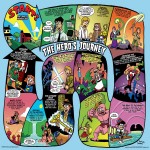 When you’ve seen as many movies as I have, you begin to see that they all follow a certain pattern. This is true not just of movies, but of all great stories ranging from those found in classic mythology and literature to modern TV series and video games. Joseph Campbell called it the monomyth or hero’s journey. It’s basically a series of steps that the protagonist must go through during the course of his or her adventure. In addition to this, there are also a number of spiritual principles that often find their way into storytelling. By combining these principles with the monomyth, you can pretty much figure out where just about any story is headed. While this skill has proven to be incredibly annoying to my wife, it’s come in very handy for me. Not because I’ve continually annoyed her with my usually correct movie and TV show predictions, but because I’ve noticed that these storytelling rules apply to more than just fictitious stories. They also apply to real life.
When you’ve seen as many movies as I have, you begin to see that they all follow a certain pattern. This is true not just of movies, but of all great stories ranging from those found in classic mythology and literature to modern TV series and video games. Joseph Campbell called it the monomyth or hero’s journey. It’s basically a series of steps that the protagonist must go through during the course of his or her adventure. In addition to this, there are also a number of spiritual principles that often find their way into storytelling. By combining these principles with the monomyth, you can pretty much figure out where just about any story is headed. While this skill has proven to be incredibly annoying to my wife, it’s come in very handy for me. Not because I’ve continually annoyed her with my usually correct movie and TV show predictions, but because I’ve noticed that these storytelling rules apply to more than just fictitious stories. They also apply to real life.
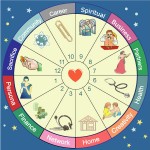 Supposedly, nobody ever said life was fair. Well, I’m saying it right now. Maybe I’m a nobody so the adage still works but I’ve come to believe that life is absolutely fair. Yes, there are selfish jerks who seem to be rewarded while truly good, hardworking, selfless people seem to be punished. There are people who’ve lived like there’s no tomorrow that live long, healthy lives while people who ate healthy, exercised and did everything right have died young. There are innocent children who suffer with terminal illness while evil dictators enjoy the good life. So how is it that I can possibly believe that life is fair? Because most people only see life on a superficial level, but it’s time that we dig a little deeper.
Supposedly, nobody ever said life was fair. Well, I’m saying it right now. Maybe I’m a nobody so the adage still works but I’ve come to believe that life is absolutely fair. Yes, there are selfish jerks who seem to be rewarded while truly good, hardworking, selfless people seem to be punished. There are people who’ve lived like there’s no tomorrow that live long, healthy lives while people who ate healthy, exercised and did everything right have died young. There are innocent children who suffer with terminal illness while evil dictators enjoy the good life. So how is it that I can possibly believe that life is fair? Because most people only see life on a superficial level, but it’s time that we dig a little deeper.
 Have you been feeling a bit dizzy lately? Does time feel like it’s been flying by faster than ever? Experiencing ringing in your ears? Seeing flashes of light or fleeting glimpses of things that aren’t there? If you’re not head-over heels in love, pregnant, or smokin’ da ganja, you may be going through what’s known as ascension symptoms. What are they, why are they happening, what do they mean, and will they ever go away? If you’d like answers to questions like these, the latest installment of Layman just might be the prescription you’ve been looking for.
Have you been feeling a bit dizzy lately? Does time feel like it’s been flying by faster than ever? Experiencing ringing in your ears? Seeing flashes of light or fleeting glimpses of things that aren’t there? If you’re not head-over heels in love, pregnant, or smokin’ da ganja, you may be going through what’s known as ascension symptoms. What are they, why are they happening, what do they mean, and will they ever go away? If you’d like answers to questions like these, the latest installment of Layman just might be the prescription you’ve been looking for.
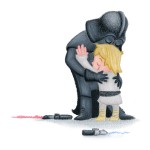 The first time I was given advice about the importance of forgiveness was at the most unlikely of places: an advertising school I was attending in Atlanta. The school had brought in speaker Joey Reiman—a very successful advertising executive who ran his own agency. Almost immediately, I could tell this man had a lot of wisdom, but it was towards the end of his presentation when something he said really resonated with me.
The first time I was given advice about the importance of forgiveness was at the most unlikely of places: an advertising school I was attending in Atlanta. The school had brought in speaker Joey Reiman—a very successful advertising executive who ran his own agency. Almost immediately, I could tell this man had a lot of wisdom, but it was towards the end of his presentation when something he said really resonated with me.
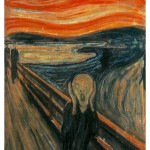 On the evening of October 6th, 2009, I awoke from a deep sleep with the sensation that there was a bright light shining on me from behind my head. Not only could I see this light, I could feel it and I soon became very hot. It felt almost as though the light were cooking me, but I didn’t want to move—or maybe, I couldn’t move. Eventually, the light faded and I fell back to sleep. So, what was it? Was it all in my mind? Was I getting some kind of program download or vibration upgrade? Was it a celestial connection? An angel communication? An alien probe? I wasn’t sure, but my forehead was very red the next morning and soon began peeling as though I’d gotten a sunburn. But this was October, and I hadn’t been out in sun for any length of time. Completely baffled, I decided to seek the help of my trusty mentor and longest childhood friend…television.
On the evening of October 6th, 2009, I awoke from a deep sleep with the sensation that there was a bright light shining on me from behind my head. Not only could I see this light, I could feel it and I soon became very hot. It felt almost as though the light were cooking me, but I didn’t want to move—or maybe, I couldn’t move. Eventually, the light faded and I fell back to sleep. So, what was it? Was it all in my mind? Was I getting some kind of program download or vibration upgrade? Was it a celestial connection? An angel communication? An alien probe? I wasn’t sure, but my forehead was very red the next morning and soon began peeling as though I’d gotten a sunburn. But this was October, and I hadn’t been out in sun for any length of time. Completely baffled, I decided to seek the help of my trusty mentor and longest childhood friend…television.
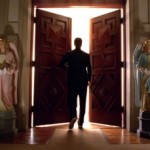 Lost is dead. Long live Lost. And so it ends, in much the same way it began—with a close-up of Jack’s eye, staring straight up past the tall stalks of bamboo that circled the sky above. This time however, that eye would close, and with it, our six-season journey that took us right back to where we started—with questions about a mysterious show that seemed to parallel the mysteries of life. For some, the journey was far more compelling than the destination. For others, it was the perfect resolution and they can walk away feeling fulfilled. Whatever you thought about the conclusion, the one thing most viewers can agree on is that the show challenged us to think in ways we might not have otherwise. In short, Lost was a real trip. And what a long, strange trip it’s been.
Lost is dead. Long live Lost. And so it ends, in much the same way it began—with a close-up of Jack’s eye, staring straight up past the tall stalks of bamboo that circled the sky above. This time however, that eye would close, and with it, our six-season journey that took us right back to where we started—with questions about a mysterious show that seemed to parallel the mysteries of life. For some, the journey was far more compelling than the destination. For others, it was the perfect resolution and they can walk away feeling fulfilled. Whatever you thought about the conclusion, the one thing most viewers can agree on is that the show challenged us to think in ways we might not have otherwise. In short, Lost was a real trip. And what a long, strange trip it’s been.
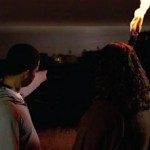 In Lost’s “Everybody Loves Hugo,” Richard complains that Jacob “never tells us what to do.” Richard’s frustration echoes clearly into our world. For most of us, Jacob, aka God, never seems to tell us what to do. He just sits back and lets us make our own mistakes, leading to countless horrors and suffering. For many, this is a major argument as to why there is no God. Yet, when watching Lost, we see that Jacob does in fact tell the Losties what to do—sometimes directly, sometimes through his lists or clues, and sometimes through messages that he passes on through his emissaries. But certainly this doesn’t happen in our world. Here, there are no ghosts of Michaels past, otherworldly whispers, or visits from dimension-hopping Desmonds to guide us on our journey through life. Or…is there?
In Lost’s “Everybody Loves Hugo,” Richard complains that Jacob “never tells us what to do.” Richard’s frustration echoes clearly into our world. For most of us, Jacob, aka God, never seems to tell us what to do. He just sits back and lets us make our own mistakes, leading to countless horrors and suffering. For many, this is a major argument as to why there is no God. Yet, when watching Lost, we see that Jacob does in fact tell the Losties what to do—sometimes directly, sometimes through his lists or clues, and sometimes through messages that he passes on through his emissaries. But certainly this doesn’t happen in our world. Here, there are no ghosts of Michaels past, otherworldly whispers, or visits from dimension-hopping Desmonds to guide us on our journey through life. Or…is there?
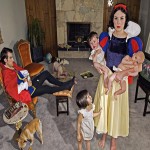 Once upon a time, you believed that you were very special. That you’d grow up to make a difference in the world, be paid handsomely for doing so, find true love, have some equally special children, and live happily ever after. Unfortunately, life hasn’t worked out quite as good as the fairytale. So, were we all lied to? In Lost’s “Happily Ever After” Desmond discovers that there is a reality where all his dreams can come true. So where is this reality and do we need to be as special as Desmond to get there?
Once upon a time, you believed that you were very special. That you’d grow up to make a difference in the world, be paid handsomely for doing so, find true love, have some equally special children, and live happily ever after. Unfortunately, life hasn’t worked out quite as good as the fairytale. So, were we all lied to? In Lost’s “Happily Ever After” Desmond discovers that there is a reality where all his dreams can come true. So where is this reality and do we need to be as special as Desmond to get there?
 If you’ve read my writings about Lost, you probably know that I believe it’s more than just a show: Lost contains hidden messages about how the world really works. That’s right, I sincerely believe that a TV series is giving us clues that can help us understand the mysteries of life. Well, if that were true, shouldn’t Lost include this little tidbit within its own mythology? Shouldn’t it demonstrate how the media can provide answers to our own life challenges so that we’ll know to look there to find them? Yes, I believe it should, and to be honest, I’ve been wondering if it was ever going to do so. In “Some Like It Hoth,” I finally received my answer.
If you’ve read my writings about Lost, you probably know that I believe it’s more than just a show: Lost contains hidden messages about how the world really works. That’s right, I sincerely believe that a TV series is giving us clues that can help us understand the mysteries of life. Well, if that were true, shouldn’t Lost include this little tidbit within its own mythology? Shouldn’t it demonstrate how the media can provide answers to our own life challenges so that we’ll know to look there to find them? Yes, I believe it should, and to be honest, I’ve been wondering if it was ever going to do so. In “Some Like It Hoth,” I finally received my answer.
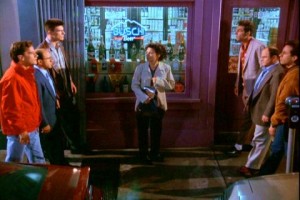 The concept behind Lost’s “He’s Our You” is that different people or things in our lives often take on very similar roles. In other words, multiple actors often play the same character in the movie that is your life experience. This intriguing concept actually reminds me of an episode of Seinfeld I first saw years ago. In “The Bizarro Jerry,” Elaine breaks up with a boyfriend but they decide to remain friends—similar to her relationship with Jerry whom she’d also dated prior to becoming friends. Comically, it turns out that this “Bizarro Jerry” has…
The concept behind Lost’s “He’s Our You” is that different people or things in our lives often take on very similar roles. In other words, multiple actors often play the same character in the movie that is your life experience. This intriguing concept actually reminds me of an episode of Seinfeld I first saw years ago. In “The Bizarro Jerry,” Elaine breaks up with a boyfriend but they decide to remain friends—similar to her relationship with Jerry whom she’d also dated prior to becoming friends. Comically, it turns out that this “Bizarro Jerry” has…
 When you’ve seen as many movies as I have, you begin to see that they all follow a certain pattern. This is true not just of movies, but of all great stories ranging from those found in classic mythology and literature to modern TV series and video games. Joseph Campbell called it the monomyth or hero’s journey. It’s basically a series of steps that the protagonist must go through during the course of his or her adventure. In addition to this, there are also a number of spiritual principles that often find their way into storytelling. By combining these principles with the monomyth, you can pretty much figure out where just about any story is headed. While this skill has proven to be incredibly annoying to my wife, it’s come in very handy for me. Not because I’ve continually annoyed her with my usually correct movie and TV show predictions, but because I’ve noticed that these storytelling rules apply to more than just fictitious stories. They also apply to real life.
When you’ve seen as many movies as I have, you begin to see that they all follow a certain pattern. This is true not just of movies, but of all great stories ranging from those found in classic mythology and literature to modern TV series and video games. Joseph Campbell called it the monomyth or hero’s journey. It’s basically a series of steps that the protagonist must go through during the course of his or her adventure. In addition to this, there are also a number of spiritual principles that often find their way into storytelling. By combining these principles with the monomyth, you can pretty much figure out where just about any story is headed. While this skill has proven to be incredibly annoying to my wife, it’s come in very handy for me. Not because I’ve continually annoyed her with my usually correct movie and TV show predictions, but because I’ve noticed that these storytelling rules apply to more than just fictitious stories. They also apply to real life.






 If you’ve read my writings about Lost, you probably know that I believe it’s more than just a show: Lost contains hidden messages about how the world really works. That’s right, I sincerely believe that a TV series is giving us clues that can help us understand the mysteries of life. Well, if that were true, shouldn’t Lost include this little tidbit within its own mythology? Shouldn’t it demonstrate how the media can provide answers to our own life challenges so that we’ll know to look there to find them? Yes, I believe it should, and to be honest, I’ve been wondering if it was ever going to do so. In “Some Like It Hoth,” I finally received my answer.
If you’ve read my writings about Lost, you probably know that I believe it’s more than just a show: Lost contains hidden messages about how the world really works. That’s right, I sincerely believe that a TV series is giving us clues that can help us understand the mysteries of life. Well, if that were true, shouldn’t Lost include this little tidbit within its own mythology? Shouldn’t it demonstrate how the media can provide answers to our own life challenges so that we’ll know to look there to find them? Yes, I believe it should, and to be honest, I’ve been wondering if it was ever going to do so. In “Some Like It Hoth,” I finally received my answer. The concept behind Lost’s “He’s Our You” is that different people or things in our lives often take on very similar roles. In other words, multiple actors often play the same character in the movie that is your life experience. This intriguing concept actually reminds me of an episode of Seinfeld I first saw years ago. In “The Bizarro Jerry,” Elaine breaks up with a boyfriend but they decide to remain friends—similar to her relationship with Jerry whom she’d also dated prior to becoming friends. Comically, it turns out that this “Bizarro Jerry” has…
The concept behind Lost’s “He’s Our You” is that different people or things in our lives often take on very similar roles. In other words, multiple actors often play the same character in the movie that is your life experience. This intriguing concept actually reminds me of an episode of Seinfeld I first saw years ago. In “The Bizarro Jerry,” Elaine breaks up with a boyfriend but they decide to remain friends—similar to her relationship with Jerry whom she’d also dated prior to becoming friends. Comically, it turns out that this “Bizarro Jerry” has…
